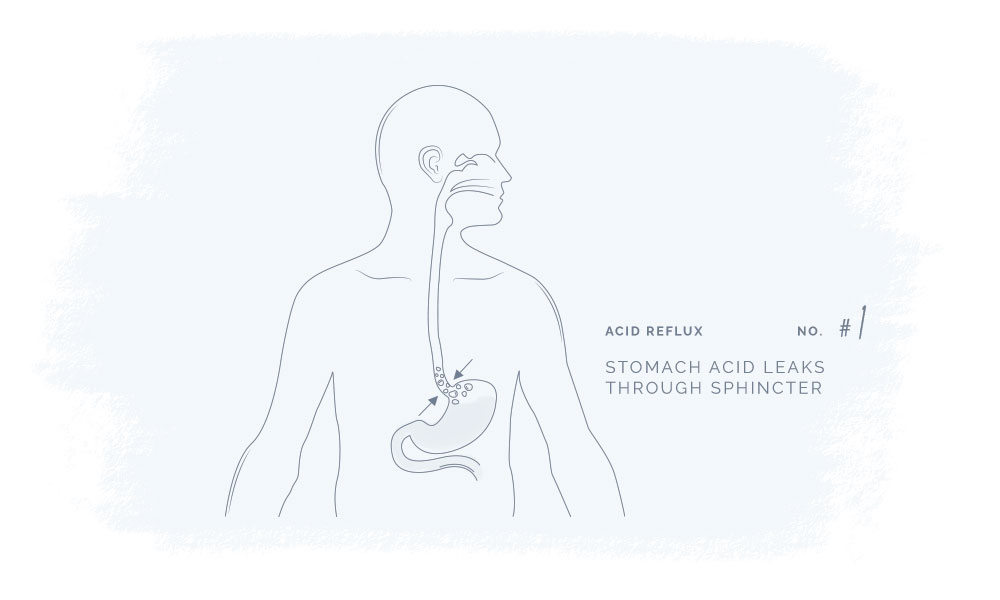Acid Reflux
Category
Digestive
REVIEWED BY
Our Biomedical Scientist
Reviewed based on
Literature Discussion
Last update
July 2020

What is Acid Reflux
Gastroesophageal acid reflux disease (GERD) is a common chronic condition where acid formed in the stomach leaks through the esophageal sphincter. The acid then irritates or erodes the lining of the sphincter called the esophageal epithelium.1
Symptoms
People suffering from GERD may experience:
- Burning sensation in the chest
- Difficulty swallowing
- Chest pain among
The connection between Cannabinoids & Acid Reflux
Studies find that CBD and THC may have great therapeutic potential and may be used to help treat Acid Reflux. CBD and THC are well-known cannabinoids, however, they do not have the same psychoactive effects. THC is psychoactive while CBD does not possess psychoactive effects. According to WHO guidelines, the cannabidiol CBD is generally well tolerated with a good safety profile.
Cannabinoid receptors can be found in both esophageal epithelial cells and neurons in the esophageal myenteric plexus, which may be involved in controlling esophageal function..
In addition, data have shown that THC plays a role in decreasing acid reflux.
However, further studies are needed to find out the full connection between the endocannabinoid system in gastro-esophageal function and the potential treatment of this disease with plant cannabinoids.2
The literature discussion is an overview of the published results from scientific studies investigating if and how cannabinoids can be beneficial in the treatment of Acid Reflux. The overview will be updated regularly to ensure the newest and most accurate information.
Cannabinoid receptors may be involved in Acid Reflux
CB1 receptors are expressed by human oesophageal epithelial cells and in Gastro-Esophageal Reflux Disease these receptors are downregulated.3/sup>
CB2 receptors are found in the digestive tract 4,however, they are not expressed in human esophageal epithelial cells3.
In a study with mice, it was shown that CB2 receptor agonists in a dose-dependent manner exhibit a protective effect against ethanol and diclofenac-induced gastric ulcers. CB2 antagonists reversed this effect.4
It was found that in the myenteric plexus of the esophagus human CB1 and CB2 receptors are expressed abundantly.5
In mice, gastric acidity and ulceration can be reduced by increasing ambient endocannabinoid levels through blocking MAGL.6
In dogs and human volunteers, the number of Transient Lower Esophageal Sphincter Relaxations was reduced by THC. CB1 antagonist SR141716A blocked this effect, proposing participation of CB1.7
Clinical trials are research studies that examine new treatments and evaluate their effects on human health outcomes.
Today, we are not able to provide any clinical trials about cannabinoids and Acid Reflux.
- https://www.mayoclinic.org/diseases-conditions/gerd/symptoms-causes/syc-20361940
- https://ghmedical.com/endocannabinoid-system/diseases/acid-reflux
- Calabrese, C., Spisni, E., Liguori, G., Lazzarini, G., Valerii, M.C., Strillacci, A., Gionchetti, P., Pagotto, U., Campieri, M., and Rizzello, F. (2010). Potential role of the cannabinoid receptor CB in the pathogenesis of erosive and non-erosive gastro-oesophageal reflux disease. Aliment. Pharmacol. Ther. 32, 603–611.
https://onlinelibrary.wiley.com/doi/full/10.1111/j.1365-2036.2010.04377.x - Salaga, M., Zatorski, H., Zielińska, M., Mosinska, P., Timmermans, J.-P., Kordek, R., Storr, M., and Fichna, J. (2017). Highly selective CB2 receptor agonist A836339 has gastroprotective effect on experimentally induced gastric ulcers in mice. Naunyn. Schmiedebergs Arch. Pharmacol.
https://pubmed.ncbi.nlm.nih.gov/28710683/ - Rohof, W.O., Aronica, E., Beaumont, H., Troost, D., and Boeckxstaens, G.E. (2012). Localization of mGluR5, GABAB, GABAA, and cannabinoid receptors on the vago-vagal reflex pathway responsible for transient lower esophageal sphincter relaxation in humans: an immunohistochemical study. Neurogastroenterol. Motil. Off. J. Eur. Gastrointest. Motil. Soc. 24, 383-e173.’
https://pubmed.ncbi.nlm.nih.gov/22256945/ - Crowe, M.S., and Kinsey, S.G. (2017). MAGL inhibition modulates gastric secretion and motility following NSAID exposure in mice. Eur. J. Pharmacol. https://pubmed.ncbi.nlm.nih.gov/28478068/
- Beaumont, H., Jensen, J., Carlsson, A., Ruth, M., Lehmann, A., and Boeckxstaens, G. (2009). Effect of delta9-tetrahydrocannabinol, a cannabinoidreceptor agonist, on the triggering of transient lower oesophageal sphincter relaxations in dogs and humans. Br. J. Pharmacol. 156, 153–162. https://www.ncbi.nlm.nih.gov/pmc/articles/PMC2697772/
CANNABINOIDS & RECEPTORS
Below you find the plant cannabinoids, cannabinoid receptors, and endocannabinoids that are associated with the potential therapy.
If you have any further information relevant to the connection between Acid Reflux and cannabinoids or find any of the information inaccurate, outdated or incomplete please contact us here.

